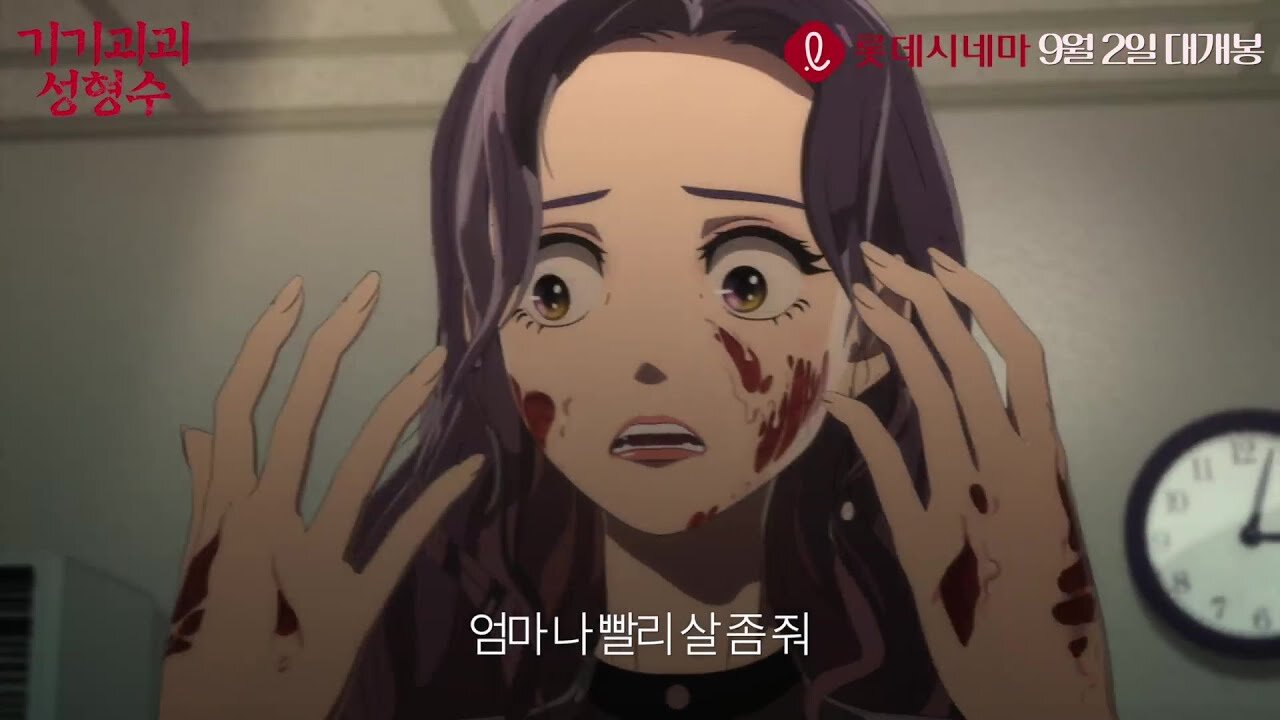[Film Review] Beauty Water (2020)
This Korean anime production directed by Kyung-Hun Cho represents a new idea of what body horror can really be.
In an era where dysmorphia, dysphoria and displeasure with one’s looks are so on the rise that young women want to get plastic surgery to look like their snapchat filters, this film seems perfectly poised as a takedown of a culture and a time obsessed with going to any lengths in pursuit of an image.
Animated in a realistic style with uncannily smooth movements, the 3D modeling starts from the beginning to give you a sense that things are out of proportion in this world. The film revolves around Yaeji, an overweight makeup artist who has felt ugly all her life. Even as a young ballerina, she missed out on opportunities and felt she came up against an “invisible wall” because of her looks. We see Yaeji’s glory days, athletically spinning like a music box ballerina, contrasting with her current life of self-loathing, binge-eating, and shame. Strangers feel entitled to laugh at her or scold her for her size or eating habits, further adding to the cycle.
Her parents want to help, but don’t know how. She trolls the internet constantly, adding to gossip about the celebrities she works with and theorizing about what plastic surgery they’ve had done. The only thing that takes her out of this cycle of shame and loathing is a mysterious product called Beauty Water, that somehow provides all the benefits of plastic surgery in a bottle. To say that things go south from there would be an understatement.
As Yaeji’s body transforms, her behaviour becomes more and more extreme in her quest for perfection. Even when she’s at her physical peak, the spectre of her former self or a version of herself with disintegrating flesh appears in the mirror or her mind’s eye. As she goes to further lengths to create the life she wants, the cost is ever-higher.
This is a uniquely Korean film, with a highly relevant message about the double standard imposed on women regarding appearance. The attitude toward plastic surgery, which is alarmingly common among young women in Korea, seems to be that one should seek physical perfection, and while plastic surgery is relatively affordable and available, women can be reviled for having gone under the knife rather than achieving their image “naturally.”
There’s so much here to unpack about gender and identity, but for now, I’ll just say that this film is pulpy, psychologically complex, and well-versed in the language of horror cinema, wearing influences on its sleeve from Ken Russell and Brian de Palma to Takashi Miike and Satoshi Kon.
The voice-acting is somewhat inconsistent as Yaeji continually changes modes of behaviour, the performance doesn’t always keep up with her, but can maintain a sweet innocence that works well as a through line. The animation and art departments worked well together, creating faces and bodies complex enough that disproportionate features and “snapchat anime eyes” are instantly recognizable as such. The editing works particularly well too, both in the homicidal confrontations and the vague “corner of your eye” imagery.
A thoroughly enjoyable horror story, from first to last, with a cerebral take on the cult of image. Worth checking out.






![[Film Review] FrightFest: Farang (2023)](https://images.squarespace-cdn.com/content/v1/5fe76a518d20536a3fbd7246/1695477980250-AVL5OD4TGXDCQSOKT2V8/Image+3.png)
![[Film Review] Little Bone Lodge (2023)](https://images.squarespace-cdn.com/content/v1/5fe76a518d20536a3fbd7246/1681028944427-XT1IPSM926J9HVL75WE5/IMAGE+1+%2831%29.jpg)
![[Film Review] Mercy Falls (2023)](https://images.squarespace-cdn.com/content/v1/5fe76a518d20536a3fbd7246/1695482997293-E97CW9IABZHT2CPWAJRP/Screenshot+2023-09-23+at+16.27.27.png)
![[Film Review] Brightwood (2022)](https://images.squarespace-cdn.com/content/v1/5fe76a518d20536a3fbd7246/1684400503767-WIQU08FS9CJJCF3JF6W1/Screenshot+2023-05-18+at+09.59.55.png)
![[Film Review] Somewhere Quiet (2023)](https://images.squarespace-cdn.com/content/v1/5fe76a518d20536a3fbd7246/1695482215451-2E146A1AFUFSWT5IZD1K/Screenshot+2023-09-23+at+16.10.43.png)
![[Film Review] Blades in the Darkness (2022)](https://images.squarespace-cdn.com/content/v1/5fe76a518d20536a3fbd7246/1684072156597-5VMZKU166Q852AU70EVL/MV5BOGNkMjg5YTQtNjQ1Mi00YzMwLTg0ZDYtMzA1NDFlNWM4MDQ4XkEyXkFqcGdeQXVyMTEzNjA1ODE4._V1_.jpg)
![[Film Review] The Resurrection of Charles Manson (2023)](https://images.squarespace-cdn.com/content/v1/5fe76a518d20536a3fbd7246/1684069540085-6KFB7SS7ZRCI5IC3ZIA9/Image+1+%281%29.png)

![[Book Review] The Exorcist Legacy: 50 Years of Fear](https://images.squarespace-cdn.com/content/v1/5fe76a518d20536a3fbd7246/1691328003764-IASXC6UJB2B3JCDQUVGP/61q9oHE0ddL._AC_UF1000%2C1000_QL80_.jpg)
![[Book Review] Nineteen Claws And A Black Bird (2020)](https://images.squarespace-cdn.com/content/v1/5fe76a518d20536a3fbd7246/1685872305328-UE9QXAELX0P9YLROCOJU/62919399._UY630_SR1200%2C630_.jpg)
![[Book Review] The Book of Queer Saints Volume II (2023)](https://images.squarespace-cdn.com/content/v1/5fe76a518d20536a3fbd7246/1697187383073-U78VOF5WVDHI9YE8M98A/Screenshot+2023-10-13+at+09.52.31.png)
![[Book Review] Cursed Bunny (2017)](https://images.squarespace-cdn.com/content/v1/5fe76a518d20536a3fbd7246/1680266256479-2E2XJT4T8CGAMOUB7XAL/298618053_5552736738082400_5168089788506882676_n.jpg)
![[Book Review] Wylding Hall (2015)](https://images.squarespace-cdn.com/content/v1/5fe76a518d20536a3fbd7246/1695484930026-PFRK7O26SLME4JIC49EW/Screenshot+2023-09-23+at+16.59.04.png)
![[Book Review] Eyes Guts Throat Bones (2023)](https://images.squarespace-cdn.com/content/v1/5fe76a518d20536a3fbd7246/1682344253308-4AAFX12YD84EVJBYNJBZ/7e617654-8d9e-407e-8cde-33a97df84dcf.__CR0%2C0%2C970%2C600_PT0_SX970_V1___.jpg)
![[Book Review] Penance (2023) by Eliza Clark](https://images.squarespace-cdn.com/content/v1/5fe76a518d20536a3fbd7246/1695481011772-L4DNTNPSHLG2BQ69CZC1/Screenshot+2023-09-23+at+15.54.07.png)
![[Book Review] Manhunt (2022)](https://images.squarespace-cdn.com/content/v1/5fe76a518d20536a3fbd7246/1683911513884-1Q1IGIU9O5X5BTLBXHV9/53329296._UY630_SR1200%2C630_.jpg)











Blending slick satire with sympathetic nuances rarely seen in films about the rich and famous, Influencer (2023) is a razor-sharp critique of online celebrity and its falsity.